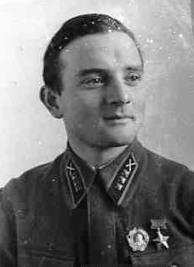David Margulis was born in 1914 in the town of Skvira, not far from Kiev. His father was a petty clerk. In 1924 his mother died, and the family moved to Kiev. David, as well as his two elder brothers Ziama and Peise, studied at a Yiddish school. In 1928, he moved to Leningrad, where his brother Peise had settled not long before. David first worked on a Jewish kolkhoz near Leningrad, then as a plumber. In 1932, he was conscripted into the Red Army and in 1933 he was sent to the Leningrad artillery school.
In 1939 and 1940, as a senior lieutenant and the commander of an artillery platoon, Margulis took part in the Finnish-Soviet ("Winter") War. It was on the Karelian Front that he was awarded the title of the Hero of the Soviet Union after his battery halted a breakthrough of Finnish soldiers on skis. Margulis was wounded during this battle.
After the German attack on the Soviet Union, as a captain in the anti-tank artillery, Margulis took part in the defense of Kiev and then of Kremenchug, in Eastern Ukraine. In 1942 and 1943 he fought in the Northern Caucasus, and later took part in the liberation of Ukraine, including Zhitomir and Berdichev, and in other operations. In the spring of 1944 Colonel Margulis was appointed commander of an artillery brigade, which should have led to his receiving the rank of general. In this capacity, he participated, inter alia, in the capture of Königsberg. He was awarded two Orders of the Patriotic War, 1st class, two Orders of the Red Banner, and other orders and medals; Margulis was wounded several times and, at least once, was sent to a military hospital in the rear.
In 1949, while studying at the Frunze Supreme Military Academy, at the peak of the Jewish Anti-Fascist Committee affair, Margulis was arrested by the MGB (which later became the KGB). He was sentenced to eight-years imprisonment (for "anti-Soviet agitation and propaganda") and sent to a camp in the Gulag. He was stripped of the title of the Hero of the Soviet Union and of all his awards. In 1955, Margulis was released and then rehabilitated. His awards, including that of the Hero of the Soviet Union were returned to him.
David Margulis died in St. Petersburg in 1993.
David Margulis's visit to the Jewish Anti-Fascist Committee
After being released from a military hospital (where he was treated after being wounded a fifth time), Colonel David Margulis arrived to Moscow, where he was to receive a new appointment, that of commander of an artillery brigade. Before he left Moscow for the front lines Margulis visited the Jewish Anti-Fascist Committee. There he told Mirra Eisenshtadt about the tragedy that engulfed his family:
"In Kiev, the Germans shot my sister Henia and my two small nephews. Perhaps, my father died with her too… The old, sick man could not leave. My elder brother Ziama left Kiev and became a partisan, he was killed… My second older brother, the machine-gunner Peise, was killed on the distant approaches to Leningrad… While we were marching through liberated Ukraine, fate brought me to my native town. I could not recognize it… In this town, where the Jewish population had been the majority, I met only one Jew [sic]: thirty-year old Hana Rubints and her son; their neighbors had hidden them in the cellar of their house… I went to the cemetery, to look for my late mother's grave, I failed to find even remnants of the monument. The Germans robbed those who were alive and those whom they had killed….
For the desecrated grave of my mother, for the graves [whose sites are] unknown to me – of my father, of Henia, Peise, Ziama, and for the hundreds of thousands of graves of my people – I have taken revenge and will [continue to] take revenge! Via an equal number of enemy bodies!"
From: GARF 8114-1-5, pp. 199-200, copy YVA JM/26072







